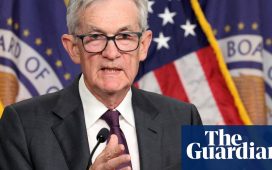
© Reuters. FILE PHOTO: An electronic board shows Shanghai and Shenzhen stock indexes, at the Lujiazui financial district in Shanghai, China October 25, 2022. REUTERS/Aly Song/File Photo
By Stephen Culp
NEW YORK (Reuters) – Wall Street faltered and 10-year U.S. Treasury yields reached a 16-year high after U.S. Federal Reserve Chairman Jerome Powell said that additional rate hikes could be warranted in view of economic resiliency and labor market tightness.
All three major U.S. stock indexes turned lower as Powell’s remarks appeared to push back against market expectations that the central bank’s rate-hiking cycle had run its course.
“The lack of clarity is causing a reduction in confidence,” said Sam Stovall, chief investment strategist of CFRA Research in New York. “And there’s really not much that the Fed’s going to say that’s going to change or clarify things.”
“Powell’s comments today indicated that there’s more to be done,” Stovall added. The Fed “won’t start to cut rates until the beginning of the second half of next year at the earliest.”
Exacerbating worries over higher-for-longer interest rates, benchmark Treasury yields brushed against the 5% level.
“The pressure (rising yields) have put on mortgage rates, as well as the concern as to what it might do for consumer spending,” has investors spooked, Stovall said. “I think investors are worried that higher rates will force a recession.”
Third-quarter reporting season has hit full stride. A mixed bag of earnings from high-profile companies such as Tesla Inc (NASDAQ:) and Netflix Inc (NASDAQ:) has sent market participants in search of an emerging common theme.
The Israel-Hamas conflict continued with air strikes pounding Gaza. British Prime Minister Rishi Sunak on Thursday followed U.S. President Joe Biden’s visit to the region to bolster support for Israel’s fight against Hamas militants and help find a diplomatic solution to the conflict.
On the economic front, existing-home sales dropped to a 13-year low, jobless claims dipped to their lowest level since January, and the Leading Economic index notched its 18th straight monthly decline.
The fell 190.23 points, or 0.57%, to 33,474.85, the lost 32.03 points, or 0.74%, to 4,282.57, and the dropped 115.51 points, or 0.87%, to 13,198.79.
European shares tumbled 1.2% to close at a two-week low as a string of downbeat earnings exacerbated investors’ risk-averse mood, driven by worries over the escalating tensions in the Middle East and uncertainties over interest rates.
The pan-European index lost 1.19% and MSCI’s gauge of stocks across the globe shed 0.89%.
Emerging market stocks lost 1.23%. MSCI’s broadest index of Asia-Pacific shares outside Japan closed 1.48% lower, while lost 1.91%.
U.S. Treasury yields surged, with the 10-year brushing against the 5% threshold as the Fed’s Powell warned that additional monetary policy tightening could be in the cards.
Benchmark 10-year notes last fell 20/32 in price to yield 4.9877%, from 4.902% late on Wednesday.
The 30-year bond last fell 47/32 in price to yield 5.1007%, from 4.994% late on Wednesday.
The greenback weakened against a basket of world currencies as benchmark Treasury yields crept higher and gold surged.
{{2126|The do fell 0.35%, with the euro up 0.46% to $1.0583.
The Japanese yen strengthened 0.06% versus the greenback at 149.86 per dollar, while sterling was last trading at $1.2149, up 0.07% on the day.
Crude prices advanced amid supply concerns that could arise should the Israel-Hamas conflict escalate.
rose 1.19% to settle at $89.37 per barrel, while settled at $92.38 per barrel, up 0.96% on the day.
jumped in opposition to the dollar’s weakness as mounting Middle East turmoil sparked safe-haven demand.
added 1.3% to $1,972.43 an ounce.







